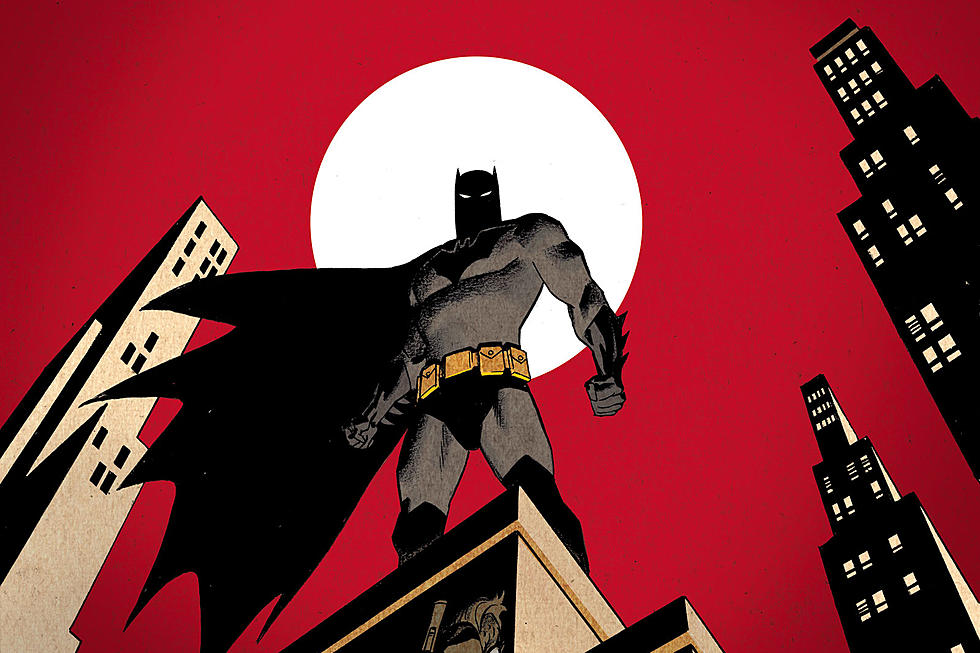
Ask Chris #235: The Case Against A Shared Universe
Q: What are the arguments against a shared universe? Like, would Hawkman be tolerable if he wasn't standing next to Superman? -- @Dan_Toland
A: I gotta say, I am probably the last person on the face of the planet that you should be coming to with this question. Not only do I love the concept of a shared universe in general, but I love it specifically in how it's evolved to become a defining feature of superhero comics, to the point where it's actually as much a part of what I think of when I hear the word "superhero" as powers and costumes.
On the other hand, I am also a dude who has never passed up an opportunity to make fun of Hawkman, so allow me to answer that part of your question first: No. Nothing will ever make Hawkman tolerable. Hawkman is the worst.
Shared universes, though, are great. I think it's a pretty natural desire among fans of fiction to see how their favorite characters would interact with each other and influence the world around each other. It's not a new idea, either --- if you really want to go all Scott McCloud on this stuff, you can go back far enough to stuff like Hercules signing up for a hitch in the Argonauts to hang out with Jason, Theseus and Orpheus, essentially forming the Justice League of Greek Mythology.
It's not just about seeing characters meet up with each other, either, although that's obviously the biggest part of it. The more stories you set in that universe, and the more conflicts and friendships and team-ups you throw into it, the more you start to develop a world that has details beyond just those characters. You start to see themes and structures, rules and quirks, and that can be something that's fun all on its own. And it's also something that you only really see in comics.
TV shows have done it, of course --- there's that entire weird network of spin-offs that spawned from Happy Days, and the late Dwayne McDuffie was fond of pointing out the connections that meant most everything from Law & Order to The Simpsons to The Andy Griffith Show were all taking place inside the snowglobe at the end of St. Elsewhere --- but to be honest, it's hard to look at those as "shared universes." There's never really that much interaction between them, and in the case of that all-encompassing snowglobe, it's more of a series of quirks than anything else. In movies --- particularly superhero movies, which are taking their cues about building continuity from comics --- you're starting to see something a little closer, but the most we've gotten there is, what, ten interconnected stories with plans for ten more?
In superhero comics, there are thousands, with hundreds of creators working on them and building a cohesive whole --- or, you know, close enough - that allows for entirely different genres to coexist side-by-side, drawing from and building the same structure. Villains created for one hero get to fight against another and bring out entirely new contrasts, plot points from one character's history can show up to influence another's future. It's great. Even the comics that I love that aren't necessarily superhero books are ones that tend to expand over time into a fleshed-out world with multiple characters that can work in starring roles, like Hellboy.
It's especially interesting to think about in the context of the DC Universe, because, as I've mentioned a couple of times before, it wasn't originally intended to be a shared universe at all. When you look at DC"s most prominent, long-standing characters, they're all the products of very individual stories, especially those Golden Age comics that were made by people who had no idea that their creations would exist twenty years later, let alone that they'd be teaming up in a book called Justice League. It's actually one of the most compelling arguments in favor of Crisis On Infinite Earths, in that it gave DC an opportunity to rebuild and integrate everything as a shared universe from the ground up. Which, as you've probably guessed by now, is something that I think is a really good idea.
But that doesn't mean there aren't arguments against it.
For starters, with a large enough universe and an equally large roster of characters, it inherently makes an individual character less special. This is the argument that I always go to with Hawkman to talk about why he's terrible: Even if you boil him down to the bare (and bare-chested) essentials, he's a dude whose sole defining trait is that he can fly. The DC Universe already has a dude who can fly, and he doesn't even need a set of wings and a complicated backstory about being a reincarnated space pharaoh to do it. Thank you for bringing the mace and all, but that position is filled.
Really, it's the same thing that I was talking about with regards to the Martian Manhunter a couple weeks ago, in that a lot of what he has to offer is stuff that's already provided by characters that are far more prominent and well-developed than he'll ever be. So the question, then, is whether these characters would be able to work in higher profile roles if they weren't in a position of being inherently overshadowed and crowded out by having to coexist with more established characters. Of course, the counter-argument to that is that you just have to figure out a new take on a character and make them fit into the gaps, and they can be just as entertaining as anything else, even if they're operating in the same circles.
The second problem with a larger shared universe is that as much fun as it is to have great characters team up and hang out with each other, it raises a lot of questions about why things don't get done a different way. It's the question of why Batman doesn't just call in Superman every time the Joker breaks out so that he can wrap things up in like ten minutes and make it home before Alfred's dinner gets cold, or why the Avengers allow the Punisher to just drive around shooting people literally all the time.
It's one of the reasons modern comics have characterized Batman as the grumpy, "stay outta my city!" type, when the pragmatic answer to literally all of his problems would be keeping Green Lantern on speed dial, and, along the same lines, the reason that writers from Mike Baron to Garth Ennis tend to write the Punisher in his own little world of crooks in dire need of bulletholes. When he's in the core Marvel Universe, that becomes a question that you almost have to address and answer. That doesn't mean that it can't be good, of course, but any time that you have to do the necessary bookkeeping, you're not doing something else.
That one's not just limited to comics, either. Kim Newman's Anno Dracula, a big literary mashup that throws everything from Darkseid to Columbo to Shaft into a world where Dracula wins at the end of the novel and takes over England in 1888, is structured as a murder mystery, but with one conspicuous absence. Sherlock Holmes is mentioned as being locked up in one of the prison camps Dracula built for enemies of his reign, and according to Newman's own annotations, this was done solely because Holmes would be able to solve the mystery that the rest of the characters are having so much trouble with by the end of the first chapter.
The third snag is that it also directs your focus, and can often direct it right away from the story you're trying to tell.
The inevitable consequence of having a universe is that you're eventually going to get a problem that threatens the universe, which is as true in comic books as it is in astrophysics. And the inevitable consequence of that is that everyone who's part of that universe should probably show up and do their part, if only to illustrate the scope of what's going on, even if it doesn't make a whole lot of sense.
I mean, just look at the image above. I'll give you that maybe, maybe Hawkman thinks he could hit something with a mace hard enough to stop the universe from imploding or whatever, but what the hell are you doing there, Vigilante? You don't even have powers! And don't give me that, "Well Batman doesn't have powers" nonsense either; you, me and Marv Wolfman all know that you ain't Batman.
Uh... anyway.
We see this a lot with modern comics and the way that they follow an event-driven model, where books are always being dragged into whatever crossover is changing everything forever this month. And again, that's not necessarily a bad thing, and you can usually get some really good stories out of it, but there is a level where it can form an obstacle that people have to write around, and it makes planning out a long-game plot a lot more difficult, since there's so much to take into account.
Those, I think, would be the major arguments, and you can find some pretty great examples to support the idea that a more isolated approach might work better. I sure as heck like Batman: The Animated Series and its tight focus more than I like Justice League Unlimited (and folks, I like JLU a lot), and while I'm sure having the Ninja Turtles show up early on didn't hurt sales, a book like Usagi Yojimbo never needed to branch out to end up with a setting and a cast that felt rich, fully realized, and compelling.
Yet ultimately there's so much that you can get out of having a shared universe --- at least in the world of mainstream superheroics --- that they're more than worth the hangups and messiness that come along with 'em. And really, they're not what's holding Hawkman back.
Hawkman is what's holding Hawkman back.
Ask Chris art by Erica Henderson. If you’ve got a question you’d like to see Chris tackle in a future column, just send it to @theisb on Twitter with the hashtag #AskChris.
More From ComicsAlliance


![Comics Alliance Provides Ringside Commentary For Hasbro’s Marvel Universe Battle Royale… Diorama [Video]](http://townsquare.media/site/622/files/2014/08/hqdefault2.jpg?w=980&q=75)


![Hasbro Unveils New Marvel Legends, ‘Iron Man 3,’ ‘Captain America 2′ And ‘Thor 2′ Toys [SDCC 2013]](http://townsquare.media/site/622/files/2013/07/hasbroboothsdcc_main.jpg?w=980&q=75)



